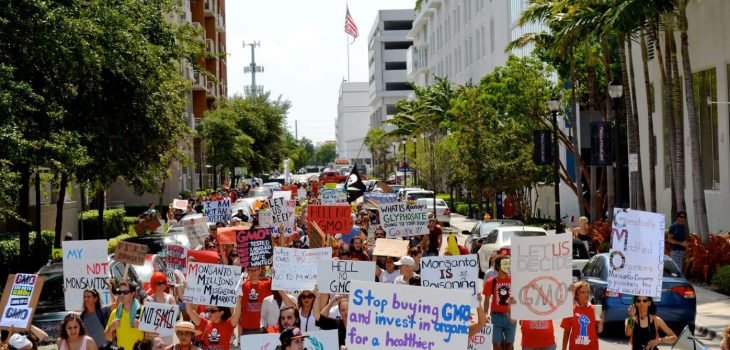 Food Policy
Food Policy
Thousands in Miami March Against Monsanto
On May 25th, over 1,500 Miamians of all ages marched up and down Biscayne Boulevard in protest of global seed giant Monsanto and to demand a GMO Free Future.
Responding to a callout to March Against Monsanto made by activist and mother Tami Canal in late February, over 52 countries and 436 cities organized rallies to raise awareness of Genetically Modified Organisms in the food supply and raise questions about their long term health impacts.
“We have in our state at least 18 other marches simultaneously” said co-organizer Trish Sheldon of GMO Free Florida and Millions Against Monsanto. “62 other countries have mandatory labeling laws or ban GMOs altogether, why not here in the US?”
The recent passage of the ‘Monsanto Protection Act’ hidden in the Farmer’s Assurance Provision, would allow Monsanto to introduce new seed crops to the market without testing and despite the health risks, even if a court rules them to be unsafe.
Many of the marchers carried signs that included bees to raise awareness of the links between neonicotinoid pesticides and Colony Collapse Disorder, which is destroying the planets bee population, and threatens our world’s ability to grow enough food. In fact, 90% of the wild bee population in the United States has already died out.
Also in attendance was Florida Senator Maria Sachs, who supported the march and plans to reintroduce SB 1728, a GMO Labeling bill to the Florida Legislature. At the march, she exhorted the crowd to send the message back to Governor Rick Scott to pass the bill “as a first step.”

Scientists and activists alike reject the commonly touted benefits of GMOs, that they are safe and that they increase crop yields. Industry groups and their lobbying arms have long exerted power over the FDA to weaken regulatory standards, even going to far as recent attempts to “hide” Aspartame in milk and milk-based products with no labeling whatsoever.
Earlier in the week, local show Let’s Talk About It Radio Program featured a panel discussion with 4 experts on the topic, including Pamm Larry who spearheaded California’s Prop 37 GMO labeling ballot initiative, and Michael Hansen PhD, scientist of 20 years at Consumers Union.
Mainstream and local media coverage of the march was almost nonexistent, with the exception of Broward New Times and NBC 6 (which significantly under-represented the crowd size as numbering in the “hundreds.”) However, both articles failed to reference the 2012 study which discovered that rats fed GMO corn over their lifetime had a significantly higher risk of developing tumors. Nor was it mentioned that 270,000 farmers in India have committed suicide as their livelihoods were threatened by an 8000% rise in seed price since Monsanto’s GM seeds entered the Indian market.
So what’s a consumer to do? A new app called Buycott has recently been introduced to the Android and App Store marketplaces. The app allows you to ‘scan as you shop’ and displays the names and affiliation of brands parent companies, helping you to avoid those that don’t support causes you believe in.
As we await to see if the Monsanto Protection Act will be repealed in the Senate, and people begin to seek out alternatives to genetically modified food, the local urban agriculture movement has been growing in South Florida. Projects by the Urban Paradise Guild, Midtown 34th Street Project, Earth N Us farm in Little Haiti, Little River Market Garden, the Urban Oasis Project, and an array of farmers markets have been generating interest in local food and the transition to a more life sustaining culture.
A global food movement is underway. Its success will require residents and local officials to be committed to enacting forward-thinking ordinances that would protect small farmers and allow for sustainable urban gardens, while demanding that food sovereignty and respect for the environment overrule corporate lobbying dollars at the national level.
